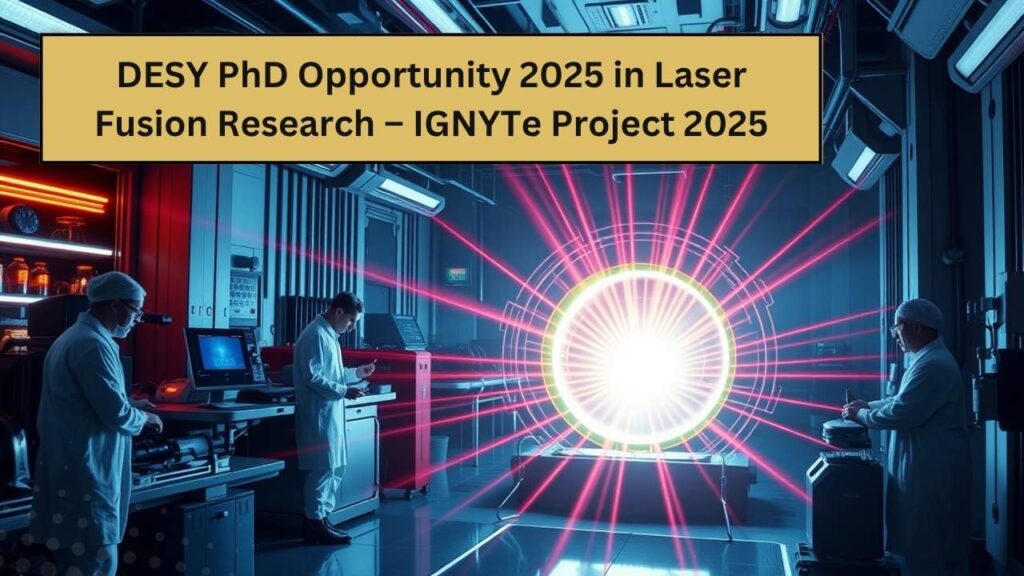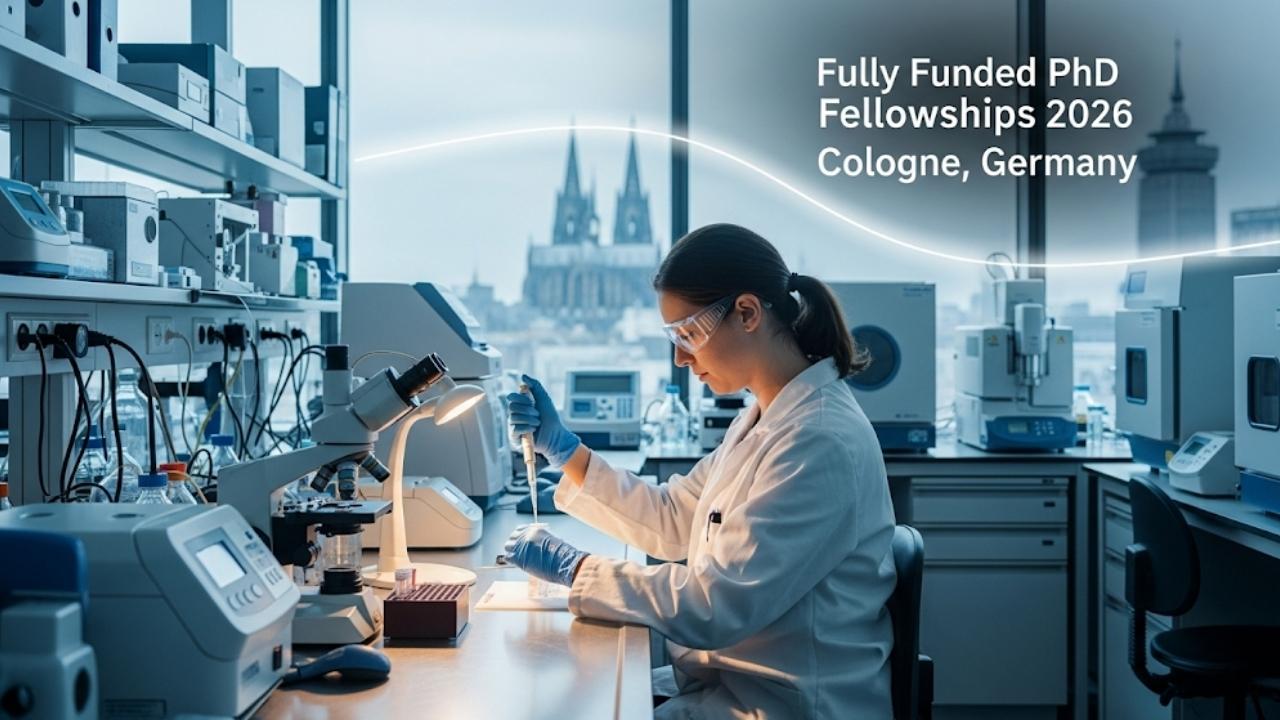
For many aspiring researchers, finding a PhD program that combines pioneering science with excellent support and a vibrant international community can feel like searching for a needle in a haystack. This particular opportunity with the IGNYTe (Inertial confinement fusion with efficient Green Nd:YLF lasers and novel Third harmonic generation) project at DESY (Deutsches Elektronen-Synchrotron) is a golden ticket.
DESY PhD Opportunity 2025 in Laser Fusion Research
| Key Fact | Detail/Statistic |
| Opportunity | PhD Student – Lasers for Inertial Confinement Fusion (IGNYTe Project) – Two positions available. |
| Research Focus | Developing efficient UV laser systems for direct-drive inertial confinement fusion (ICF) technologies. |
| Location | DESY, Hamburg, Germany |
| Application Deadline | June 30, 2025 |
| Start Date | September 1, 2025 (or as soon as possible) |
| Duration | 3 years |
| Funding | Remuneration according to TV-AVH regulations (German public service salary scale). |
| Doctoral Degree Conferral | In collaboration with the University of Hamburg. |
What is the DESY PhD Laser Fusion Research IGNYTe Project 2025?
The DESY PhD Laser Fusion Research IGNYTe Project 2025 is a specialized doctoral research program hosted at DESY in Hamburg. DESY is one of the world’s leading research centers for particle physics, accelerator technology, and photon science, boasting a rich history of scientific breakthroughs. You can learn more about DESY’s incredible work on their official website (opens in new tab).
The IGNYTe project itself is a forward-looking initiative funded under Germany’s “Fusion 2040” program. Its core mission? To tackle a significant challenge in laser fusion: creating highly efficient, powerful ultraviolet (UV) laser systems. These lasers are critical for “direct drive” inertial confinement fusion (ICF), a promising approach to achieving controlled nuclear fusion and, ultimately, a clean and virtually limitless energy source.
As a PhD student in this project, you won’t just be an observer; you’ll be an active contributor. Two specific positions are typically advertised under this project:
- One focused on laser development, potentially involving the design of fibre or solid-state laser front-ends and shaping nanosecond laser pulses.
- Another centered on broadband UV-generation, which might involve building nonlinear multi-pass cells and exploring advanced nonlinear optics.
This research is at the very forefront of Laser Fusion Research Opportunities, aiming to advance the technology readiness level (TRL) of these critical laser systems.

Eligibility Criteria: Is This Your Calling?
To be a strong candidate for the IGNYTe Project PhD, you’ll need to meet specific academic and skill requirements. In my experience advising students on highly competitive international PhD programs, demonstrating both a strong foundational knowledge and genuine enthusiasm for6 the research area is key.
Here’s what DESY is looking for, based on their official announcement on the DAAD portal (opens in new tab):
- Academic Qualification: A Master’s degree (or equivalent) in physics, optics, photonics, laser technology, or a closely related discipline.
- Practical Experience: At least six months of hands-on experience working in a laser laboratory. This is crucial as the project is experimentally focused.
- Technical Knowledge: A profound understanding of pulsed laser systems and/or perturbative nonlinear optics. Depending on the specific position, expertise in either laser development or UV generation techniques will be an advantage.
- Teamwork & Communication: The ability to work effectively as part of an international, interdisciplinary team is vital. Good communication skills are a must.
- Language Proficiency: A good command of English (the working language). Knowledge of German can be beneficial for daily life but is not typically a primary requirement for the research work.
- Motivation: A high level of motivation to contribute significantly to fusion energy research and tackle complex scientific problems.
- University Admission: Successful candidates must also satisfy the admission requirements for doctoral research at the Faculty of Mathematics, Informatics and Natural Sciences at the University of Hamburg, as DESY collaborates with the university for conferring PhD degrees.
DESY actively promotes equal opportunities and diversity, strongly encouraging women and underrepresented groups to apply.
Benefits of Joining the IGNYTe Project at DESY
Embarking on your PhD journey with the IGNYTe Project at DESY is more than just an academic pursuit; it’s a comprehensive career-building experience.
- Cutting-Edge Research: You’ll be at the heart of pioneering research in laser fusion, a field with immense potential for future energy solutions.
- World-Class Facilities: DESY provides access to state-of-the-art laboratories, high-performance computing clusters, and a unique research infrastructure.
- Expert Mentorship: Work alongside and learn from leading scientists and engineers in laser physics and fusion technology.
- Full-Time Research Focus: Unlike some PhD programs, these positions typically do not involve teaching responsibilities, allowing you to dedicate your time entirely to your research.
- Financial Security: Successful candidates receive a contract with remuneration based on the TV-AVH scale (Collective Agreement for the Public Service of the Länder). This generally provides a comfortable living wage in Germany.
- Travel & Commuting Support: DESY often offers employees a financial supplement for the “Deutschland-Ticket,” facilitating affordable public transport across Germany.
- International Collaboration: Engage with a vibrant, international scientific community, with opportunities to present your work at global conferences and publish in high-impact journals.
- Career Development: Gain invaluable experience in optics, photonics, and high-power laser systems – skills highly sought after in both academia and industry. DESY also provides comprehensive training and development opportunities.
- Supportive Environment: DESY emphasizes a respectful and collegial atmosphere, with initiatives supporting work-life balance and well-being.
Application Process Step-by-Step
Navigating PhD applications can seem daunting, but breaking it down7 makes it manageable. Here’s a general outline of what to expect for the DESY IGNYTe PhD application, primarily through their online portal as indicated on the DAAD announcement (opens in new tab):
- Check Eligibility & Deadline: Ensure you meet all criteria and note the June 30, 2025, deadline.
- Prepare Your Documents: Gather all necessary paperwork (see checklist below). This is often the most time-consuming part.
- Visit the Application Portal: The official call (e.g., on the DAAD website or DESY’s career page when active) will direct you to DESY’s online application system.
- Complete the Online Application Form: Fill in all required fields accurately.
- Upload Your Documents: Submit your prepared documents as per the portal’s instructions.
- Arrange for Letters of Reference: DESY typically uses an online tool for the submission of reference letters. You’ll likely need to provide contact details for your referees, who will then be invited to submit their letters directly. Ensure your referees are aware of the deadline.
- Submit Before the Deadline: Double-check everything and submit your application well before June 30, 2025.
- Selection Process: Applications will be reviewed by a committee. Shortlisted candidates may be invited for an interview (potentially online).
Required Documents Checklist
Having your documents in order is crucial. While the exact list can vary slightly, typical requirements for a DESY PhD application like this include:
- Cover Letter (Motivation Letter): This is your chance to shine! Explain your strong interest in the IGNYTe project, your relevant skills and experience, and why you are a perfect fit. Tailor it specifically to the project.
- Curriculum Vitae (CV): A detailed CV, usually in a standard European format (like Europass, though not always mandatory). Highlight your academic background, research experience (especially laser lab work), publications (if any), and relevant skills.
- University Transcripts & Certificates: Official copies of your Master’s and Bachelor’s degree certificates and transcripts of records (mark sheets). If not in English or German, certified translations may be required.
- Two Letters of Reference: These should be from academics (e.g., professors or supervisors) who know your work well and can attest to your research potential and suitability for a PhD. As mentioned, these are often submitted directly by referees via an online portal.
Tips for a Successful Application
Based on my experience, many successful applicants focus on clearly articulating how their past experiences directly prepare them for the specific challenges and goals of the PhD project. Here are some tips:
- Understand the IGNYTe Project Deeply: Go beyond the surface. Read any linked publications or project descriptions carefully. Show in your cover letter that you understand the scientific context and challenges of the IGNYTe Project DESY.
- Highlight Relevant Lab Skills: Since hands-on laser experience is a key criterion, be very specific about your skills with pulsed lasers, optics, vacuum systems, data acquisition, or any other relevant techniques you’ve mastered.
- Tailor Your Cover Letter: Avoid generic statements. Explain why this specific project at DESY excites you and how your research interests align with the work on UV laser systems for fusion. Address the specific position (laser development or UV generation) if you have a preference and relevant background.
- Quantify Achievements: Where possible, quantify your accomplishments in your CV (e.g., “improved laser stability by X%,” “co-authored Y publications”).
- Choose Referees Wisely: Select referees who know you well and can write strong, detailed letters. Provide them with information about the PhD position and your CV to help them write a targeted reference.
- Proofread Meticulously: Ensure your application is free of typos and grammatical errors. A polished application reflects professionalism.
- Contact the PI (Optional but Recommended): If you have genuine, specific questions about the project after thoroughly reading all available materials, you could consider politely contacting the named contact person (Dr. Marcus Seidel, as per the DAAD posting). This shows initiative but ensure your questions are insightful.

Life as a DESY PhD Student in Hamburg
Life as a PhD student at DESY in Hamburg is more than just lab work. Hamburg is a vibrant, international city with a high quality of life. DESY itself fosters a multicultural environment with employees and researchers from around the globe.
- International Community: You’ll be part of a large community of international students and researchers.
- Work-Life Balance: DESY generally promotes a good work-life balance, with flexible working hours (where project work allows) and support for families.
- Social Activities: There are often social events, sports clubs, and cultural activities organized for DESY staff and students.
- Language: While English is the working language in many research groups, learning some German will greatly enhance your daily life in Hamburg. Language courses are often available.
- Hamburg: Explore a major port city with beautiful canals, parks, a lively music scene, and countless cultural attractions. Learn more about the city on the official Hamburg website (opens in new tab).
This is a great opportunity to not only advance your scientific career but also to experience life in a dynamic European city.
DESY often shares glimpses into life at the research center on its social media channels.










